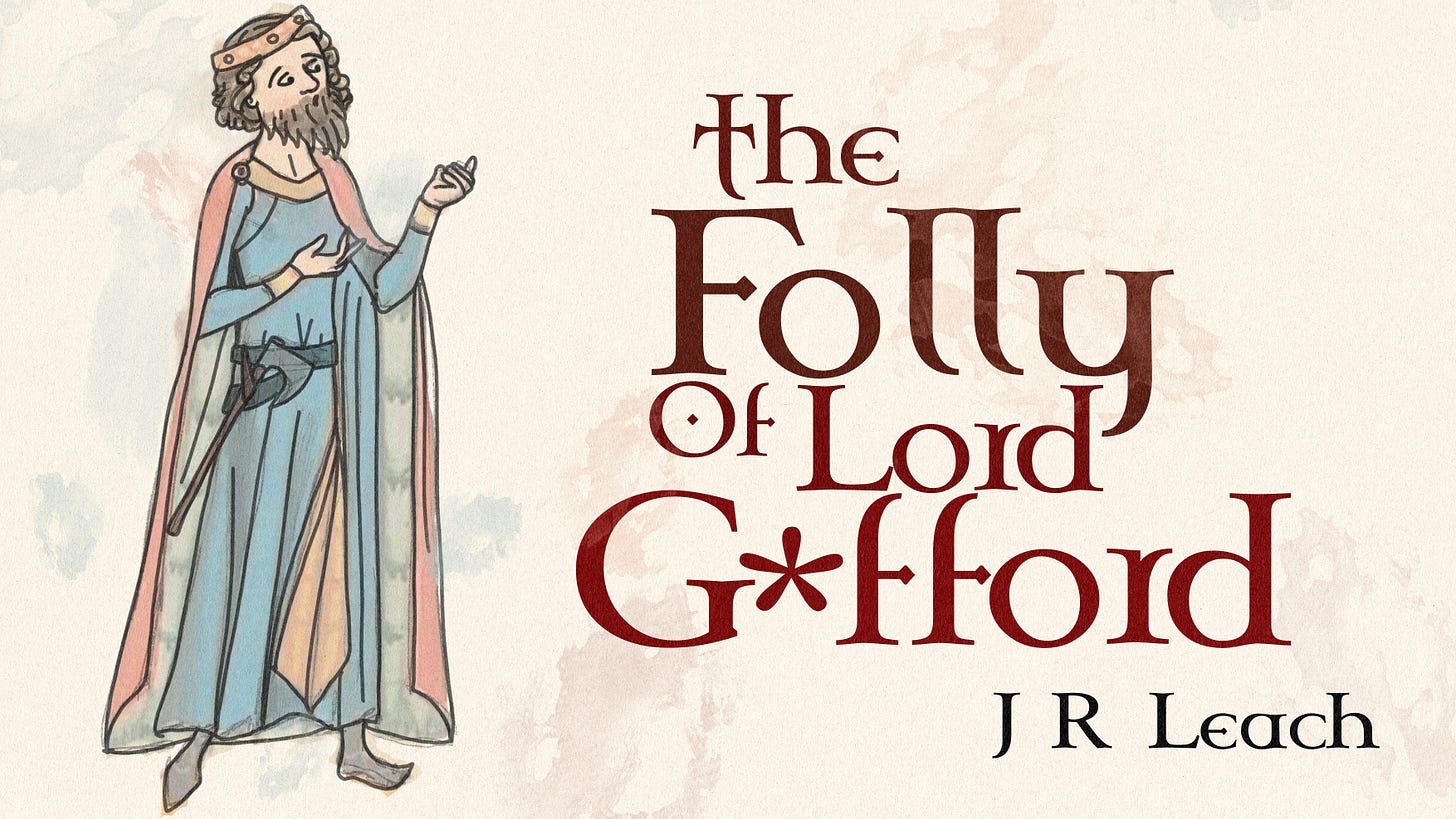“Oi!” barked a gruff voice.
Tyr’s heart faltered.
“I’ve been marching these same four corners since sundown, and here you are blissful as ya please.” Tyr peered through the golden branches of the willow, closing one eye to help her focus. She heard a scuffle of movement.
“Restin’ my eyes is all,” a gruffer voice gave, sounding none too concerned by the comment. “Get to my age, and might be you can rest yours.” The gruffer voice yawned, and Tyr could see him fold his arms and close his eyes.
“Don’t let her ladyship catch you,” the younger warned. “You hear me? It’ll be all our heads if them lot get loose.” The crossbowman waited for a reply, but when nothing came but a thunderous snore, he drove a firm kick into the elder’s boot.
“Lazy gaffer,” the crossbowman spat and walked away, muttering foul curses.
The Farmer and the Fald - Tyr’Dalka II - Part 4
It's a common trope in sci-fi and fantasy to develop a “fantasy cuss”, thus freeing the writer to swear as much as they wish without having it become ‘edgy’ or overly aggressive.
I utilise this trope in my fantasy world, and even went that extra mile and constructed a short piece of historical in-world lore that explains how this particular slur arose.
Enjoy!
Several years ago, my brotherly duties saw me wintering at the noble court of Black Harbour. It was a dark day in the month of Reeds when the liege lord of the port, one Geiger Greenwater, invited me to sup with him and his at the lord’s high table.
His lady wife and noble sister were weaving baskets by the hearth, I recall, surrounded by a half dozen little lords and ladies, clutching at their mother’s skirts, fencing with twigs of hazel or practising their needlework.
Jarl Greenwater sat imperiously on his high seat, a throne carved from the twisting, petrified roots of an ancient, knotted blackwood tree. The Jarl draped a leg o’er the arm of his chair as he plucked listlessly at a weather-beaten, seven-string lyre. He had a mane of black curls, gloriously primped to a shimmer, with a pointed black beard he had braided into three points; draped over him was an elaborate green robe lined with black fur and wrought with emerald, onyx and silver threads.
There was an odd melancholy to the Jarl’s hall, and at first, I could not decipher why. But I soon learned that Jarl Greenwater had a rather sombre disposition, prone to dour musings, whose thoughts often entangled with the oblique and unknowable future.
“Will the skalds sing of Lord Geiger, Brother, when I am no longer here to listen?” The musing lord enquired, contorting his hand across the lyre’s frets and strumming a gentle chord. The lord winced to hear its discordance, setting his hands to further tuning.
I, being a somewhat obsequious young priest and not wishing to offend the high lord in his own hall, did not know how to answer. But rather than give an instinctive and unflinching ‘yes’, I chose instead to divert the question.
“Does my Lord of Black Harbour truly wish for such?” I asked him with a coy smile, piling my trencher high with smoked fish and black bread. The Lord shifted in his seat.
“What man among us does not?” He asked back, eyeing me curiously. “What soul has not dreamt that their name might be whispered and lauded by a secure and devoted descendency?”
“Oh, all men, without a doubt,” I quipped back, licking the grease from my fingers and draping a kerchief across my lap. “But one should be most careful what they wish for, should they not, my Lord?”
“Explain,” instructed the Jarl, setting his lyre to one side.
“Consider Lord Gafford,” I stated boldly.
The court was shocked to silence. By the hearth, I saw Lady Greenwater scowling fiercely, covering the ears of her youngest. The older children were giggling behind their hands while Lord Greenwater stifled a haughty laugh, which made his children, nieces, and nephews giggle all the more, much to the chagrin of his lady wife and noble sister.
“None could ever hope to be so famous as he,” Jarl Greenwater bellowed gleefully, the hall’s melancholy making a speedy departure. I finished my fish and bread supper, shared a few songs with the old man, told some bawdy jokes and then went on my way, considering my brotherly duties fulfilled.
For indeed, Gafford the Dimwit, the Old Gaff, or The Hen and Hounder is the most spoken name across the known world, snow to sand and storm to storm. But it is ne’er said in reverence.
For those who do not know, Lord Gafford lived in a small holdfast on the banks of the River Gaff nearly two centuries ago when the northern isle of Brentir and the southern isle of Kraigwyn had been at war for half a hundred years.
A declaration of peace had been sent, awaiting the Jarls of the North and the Lords of the South to treaty together; and decide the terms.
Such attempts were made rarely; for there were many grievances between the two, as indeed, there still are.
Some nameless counsellors suggested that an ‘exchange of culture’ might dull the lingering animosity, so each side granted a gift to the other.
The southern Lords gifted a hundred golden hens, birds known only in Kraigwyn, larger than most domestic breeds, whose feathers and eggshells gleamed as gold. While the northern Jarls of Brentir gifted two score o’ their best bloodhounds, Veidiri, purebred hunters.
Lord Gafford, minor Brentiri nobility, had the poor luck of being equidistant from each Isles’ capitol and was thus charged to house both hen and hound until a formal exchange could be held. The High King of Brentir and the Lord Prefect of Kraigwyn arranged a parley for the first time in five and thirty years to put bad blood behind them.
If only all had gone as planned.
But none had considered one man's ludicrous oversight, for Lord Gafford—who had never cared much for animals, politics, or anything beyond his small keep—housed both hen and hound together that night.
I need not say what they found come morning. But of the one-hundred and twenty-four beasts in Gafford’s care, only eight-and-ten—incredibly bloated—hounds remained, snoozing amidst a blizzard of golden feathers. Four of the Veidiri had succumbed to their gluttony and had either gorged or choked themselves to death.
A grisly sight, indeed.
The southern Lords thought it a deliberate slight; the northern Jarls thought it a treacherous conspiracy.
And the war waged on.
The High King took Lord Gafford’s head for his incompetence, and his humble keep was left to moulder on the Gaff’s muddy banks.
But so persistent was Lord Gafford’s legacy that now, in our modern days, when one walks the docks or the slums of any city across the King’s Isles, there is a cacophony of 'g*ff' this and 'g*ff' that, the poor lord’s name transfigured into perhaps the basest verb in our fair language, conjugated often and cruelly; g*ffing, g*ffer, g*ffed, plus many more colourful and creative applications besides. Indeed, the curse has become so foul and vulgar o’er the years that it is scarcely spoken in high society; its mere utterance might cause a lady’s eyes to water or a fair maiden to faint in shock. It is proper in such circles to use the more genteel: 'hen ‘n hounder' variant—if such an insult is ever deemed appropriate in noble company.
I do wonder what Lord Gafford would make of his name being bandied about like a slap across the face, shrieked and bellowed by dockworkers and courtesans in the small hours, or whispered in annoyance under one’s breath. All Lords seek remembrance, after all, so I imagine it might instil some pride in the poor, foolish lord, for it is no small accomplishment to bear the most uttered name in the world.
The silly old g*ffer.
Greenjack Jorkin
If you have liked what you’ve read, please consider sharing and subscribing or even buying my book!
I am a fantasy author, illustrator and aspiring poet. If you’d like to help support my projects, you can find my fantasy work here. Thanks for reading Greenjack's Journal! Subscribe for free to receive new posts and support my work.





